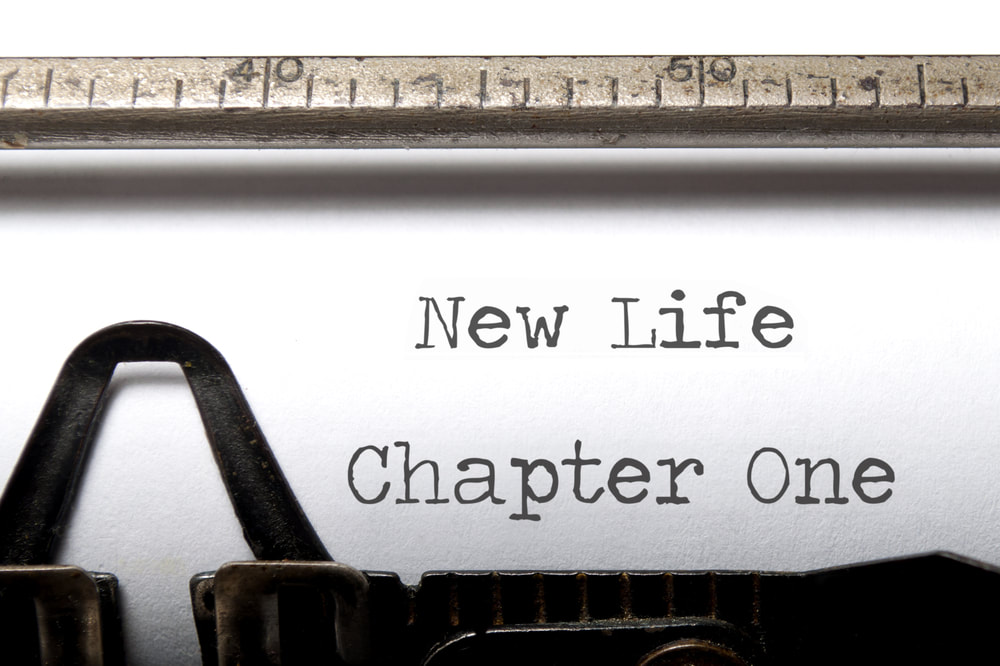|
On the cusp of a breakup, separation, or divorce, it is common for people to focus mostly on what they will lose: a spouse or partner, time with their children, relationships with the ex's family and friends. The list goes on and on. As a separation and divorce counselor, I like to help clients honor the pain of loss while reminding them of what will also be gained: relief from the tension of a relationship that wasn't working, the confidence of knowing they can thrive on their own, new experiences with people they've yet to meet. This list, too, can go on and on. When the basic business of just getting by (e.g., getting out of bed, taking a shower, going to work, etc.) seems herculean, it's hard to trust that the future will be bright. But, with a little mindfulness, some time, and some effort, it is possible to thrive after a breakup, separation, or divorce. If you are in the pain trenches of acute loss, here are a few tips to help guide you toward a brighter future:
Even if you don’t believe it right now (which is okay), you are heading toward wherever you are meant to go. What if this ending is an invitation to feel as whole as you already are? Dr. Jill Gross is a licensed psychologist, therapist, and counselor. She offers grief therapy, divorce consultation, co-parenting support, and other counseling services in the Phinney Greenwood area of Seattle, WA. If you would like support in finding the forward path, schedule a free consultation to see how divorce counseling can help.
0 Comments
Dear Dr. Jill,
I’m a 35-year-old female who has been making the online dating rounds for a while now. After many dates with many people who were not a good fit, I finally met someone amazing. On the first date, sparks flew. We talked about wanting more out of life, being tired of the whole “casual hookup scene,” wanting to settle down, get married, and eventually have a family. The physical sparks were there too. We couldn't keep our hands off of each other. I ended up staying the night and we ended up having sex. It was mind-blowing! Sex is something I vowed never to do on a first date. After one of the most amazing nights of my life, my date and I said goodbye and agreed to go out later in the week. He said he would call or text me to set something up. A week passed. Then two weeks. Then a third. I reached out to him a few times and, each time, he wrote back with brief, one-word answers. I asked about getting together. He responded vaguely and never got back to me. I was very hurt and confused by his behavior. Was this the same guy I met less than a month ago? Anyway. He reached out to me last night, asking to get together. I really like him and would very much like to see him again but I’m still stinging from the roller coaster of the last three weeks. I don't often meet men I'm so compatible with. I'm afraid of closing the door on something (or someone) with promise. Should I tell him that my feelings are hurt? Am I being too sensitive? Should I just accept his invitation and forget the whole thing ever happened? I don't want to scare him off by coming on too strong or by acting needy or clingy. Would appreciate your thoughts on what to do. Signed, Bothered and Bewildered Dear Bothered, Oh girl. What stands out most in your letter is not that you seem needy or clingy. It's the amount of fear and self-doubt you feel--only a few weeks after meeting this guy! I had two thoughts when I read your letter. The first pertains to the breaking of the vow you made to yourself about proceeding a bit more slowly when it comes to being intimate with someone. This is something most of us either have done or will do at some point in our lives. So no judgement here. That said, we need boundaries to feel safe and secure in any relationship, romantic and otherwise. When we behave out of accordance with our own boundaries, it is normal to feel insecure. In this case, I suspect your fear of seeming "needy" or "clingy" is a manifestation of this insecurity. The second thought I have is about your date's behavior. In short: it's really bad. I’m wondering if you feel confused because this man's behavior is the very definition of confusing: hot one minute; lukewarm—even cold—the next. Given the first date you described, anyone would be left wondering what the hell just happened. This is not needy or clingy. Yours is a natural reaction to inconsiderate behavior your date has yet to own or apologize for. This is a big red flag in my dating book. Before you do anything, I recommend sitting quietly with yourself and taking an honest inventory of what it is you really want. Do you want a hot fling or a deeper, more stable relationship with an emotionally available partner? Though his words may have indicated otherwise, I suspect your date is capable of offering you little more than a (temporary) good time. If you decide that you want stratospheric chemistry (aka white hot sex), by all means, accept his offer. Just know that, if you have real feelings for this man and/or if you want a real, committed partnership, each hookup with this guy is likely to be followed by an unceremonious thud back into fear, confusion, and yearning. For more on that, click here. Many of us mistake chemistry for connection. It’s easy to do. The former tends to be instantaneous, short-lived, and drug-like. The latter requires patience, consistency, and time to develop. Not exactly the stuff that James Bond movies are made of but, in the long run, a much better emotional bet. Bottom line: if a solid, stable partner is what you are really looking for, I strongly encourage you to look elsewhere. No man worth his salt would ever dream of leaving someone he cares for guessing about his feelings or intentions. Here’s to a more satisfying future dating experience! Yours in health, Dr. Jill Dr. Jill Gross is a licensed psychologist, counselor and dating coach in Seattle, Washington. Emotionally unavailable partners got you down? You deserve better! Find out how hiring a dating coach can help you have a richer, more satisfying relationship experience. Schedule a free dating consultation today!
Something strange is happening in Seattle. Mother nature appears to have gotten the memo, albeit a month later than the rest of the country, that Spring has arrived.
As I’m writing this, it’s a balmy 74 degrees outside, the gardens are in full bloom. Like earthworms after a good soaking, Seattleites are creeping out in droves from their bookstores and coffee shops to pay tribute to the one thing we all yearn for but cannot control: the sun. Closet mainstays of Gortex and fleece have been temporarily exchanged for tank tops and shorts. The Greenlake lawn is smattered with blankets and picnic baskets. Translucent limbs gently tip toward the golden orb that forsakes them for two-thirds of the year. Fellow park goers pass one another with chins held a little higher, smiles a little wider, freely spouting weather-related pleasantries, exchanging gleeful, knowing glances. It is as if everyone in the city is holding the same winning lottery ticket. While out walking today, I started thinking about why Seattleites go nuts when the weather is nice. A story came to mind about a man who immigrated to the United States from a poor, rural part of India. Upon his first trip to an American grocery store, the man fell to his knees and wept. When his companion asked why the man was crying, he replied, “Such abundance! How is one to appreciate anything?” Indeed, the first sunny day in Seattle nicely exemplifies how scarcity can beget tremendous gratitude. The city's residents savor every moment of sunshine because we know it won’t be long before it disappears. We resent the rain, yet we also know it is the prerequisite for the flowers and fruit trees that dazzle us come springtime. Life is the same way. When we are experiencing a long stretch of suffering or scarcity for which there is no scheduled ending, it is easy to get mired in dark emotions. Every human emotion comes with its own, unique script. Most commonly, when we are suffering, we feel hopeless which, for most of us, sounds like “I am trapped in a hole that is too steep to climb. I will be here forever.” These thoughts are pretty convincing. They seem real, but they are not true. Hopelessness is just like any other emotion, free to come and go, once fully permitted to exist. It is normal to resist suffering out of fear of being carried away by its undertow. In lieu of curious examination of our feelings, we often shame or judge ourselves for having them. Allowing space for dark emotions is not synonymous with succumbing to them. The opposite is true. The more we resist what we are feeling, the more likely our feelings will manifest in ways that don’t serve us (e.g., explosive rage, drinking or drug use, shopping, gambling, etc). In other words, we are fated to act out our feelings until we are ready to learn from them. Life is fraught with suffering. We cannot sidestep it altogether; we must go through it. Here are a few things to keep in mind as you inch your way forward:
Sometimes the lessons we are meant to learn from suffering require additional resources, such as a licensed psychologist, therapist, or counselor. If everything you’ve tried on your own doesn’t seem to be working for you, widen your circle to include a trusted professional. Your mental health is worth the investment! Have you found an effective way out of suffering? Tell us all about it in the comments section below! Dr. Jill Gross is a licensed psychologist, therapist, and counselor. She offers grief therapy, divorce support, and other counseling services in the Phinney Greenwood area of Seattle, WA. Scarcity got you down? Schedule a free consultation to find out how therapy or counseling can help you lead the life of abundance you deserve!
Grief is a sneaky bugger. Like variegated yarn it weaves its way into our lives, resulting in subtle (sometimes not-so-subtle) changes in hue. While most of us expect to mourn death, divorce, or disease, we are confounded by loss that cannot be touched or researched in any scientific journal: that of innocence.
For me, it all started with Santa. I still remember the moment my older sister and I put the pieces together: one portly man, a magic sleigh loaded with presents, pulled by flying reindeer, shimmying down the flues of houses all over the world in one night? Ya. Right. And, hey, didn’t the handwriting on Santa’s thank-you notes bear a strong resemblance to our father’s? The look on our mother’s face when we confronted her with the case files merely confirmed the gig was up. I thought I would feel proud for solving the Santa mystery. Instead, I was disillusioned by the years of tooth money, chocolate bunnies, and carefully-filled stockings, not purveyed by magical figures from faraway lands, but by the two hands of my very real parents. I was too young to know it then, but this moment was the first pearl in strand of ideals that would eventually break apart as I got older. From birth until about age seven the part of our brain responsible for logic and reason (prefrontal cortex) is undeveloped. From age seven until approximately twenty-five, prefrontal synapses burgeon. As they do, our problem-solving ability advances and the idyllic lenses through which we view world are gradually replaced by realism. What no one ever tells us is just how emotionally difficult this process can be. Life chips away at our ideals until the pain of holding on to them is greater than the pain of letting them go. Here are the most commonly grieved ideals I have encountered in my work as a therapist:
The age at which we recalibrate our assumptions will vary according to our personal circumstances and degree of openness. Though its intensity eventually subsides, grief is often cyclical and ongoing. Life has an uncanny gift for shining light on the places that may always be tender. For instance, the childhood wounds we made peace with in early adulthood can be reawakened when we become parents. This can also happen when our children reach the age(s) we were originally injured. The next time you feel as if there has been a terrible mixup in the cosmic kitchen, ask which of the above ideals you may be struggling to recalibrate. Need help? Try scanning your internal dialogue for "shoulds" (e.g., “My parents should have been more responsive.” or “My relationship should have lasted."). "Should statements" are the expression of an unconscious wish to live more freely. Instead of telling yourself how things should have been or how they should be, remind yourself that everything you experience is divinely chosen for your healing and growth. Gently loosening the grip on idealistic assumptions allows us to make peace with what is. Dr. Jill Gross is a licensed psychologist, therapist, and counselor. She offers grief therapy, divorce support, and other counseling services in the Phinney Greenwood area of Seattle, WA. Struggling with something that didn't turn out quite the way you wanted? Schedule a free consultation to find out how therapy or counseling can help you find peace! |
AuthorDr. Jill Gross is a licensed psychologist, specializing in grief and divorce. Her coaching and therapy practice is located in the Phinney - Greenwood area of North Seattle in Washington. Archives
May 2021
Categories
All
|
HoursM-TH: 8:30 AM - 2:00 PM.
By Appointment Only |
Telephone & Email |
Address503 N. 50th Street
Seattle, WA 98103 |
*Header Photographs courtesy of Josh Martin






